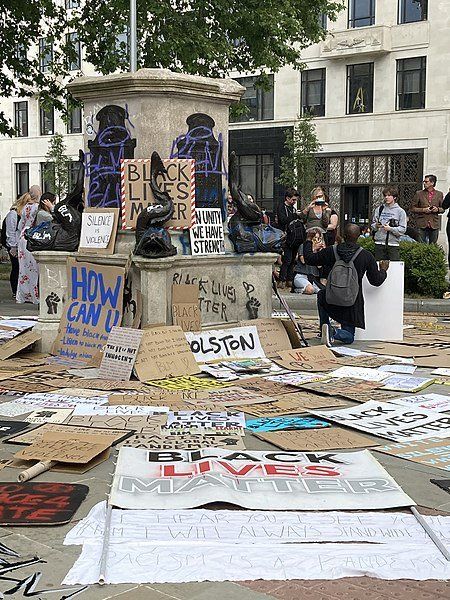Bristol's BLM Statue Removed
Ben Walker - UKIP Chairman • 16 July 2020
News & Social Media / Post
UKIP's latest press release in response to the removal of the BLM statue
UKIP Chairman Ben Walker congratulates the Bristol council on its swift decision to remove the BLM statue that was erected on the Edward Coltson plinth.
Bristol resident Mr Walker said the sculpture was "divisive" and "an attempt by the artist to get some fame by exploiting divisions in the City."
The city's mayor Marvis Rees has previously said the choice of a replacement statue should be made democratically.
"Bristol does not need this latest attempt to cause a divide between the city's residents: the people living here have not made a living from the slave trade, do not support the slave trade but are being made to feel like they have some inherited shame from Bristol's involvement in the Transatlantic slave trade," said Mr Walker.
"I worry that the great efforts which have been made in recent decades to improve community relations are now being ripped apart.
When people think of Bristol now they probably think of the statue of Edward Colston being torn down by protestors. There is no mention, for example, of Pero's Bridge: a footbridge named to honor the many unknown African men, women and children who were enslaved.
Bristol City Council are desperately trying to breathe economic life back into this city; to encourage new investment and to create a positive brand which will benefit everyone living here - no matter what community they are from. Having a sculpture of someone who broke the law, arm raised in a 'black power' salute will not help that goal.
That cannot happen if there are groups of people who constantly want to stoke the flames of tension. We must not erase our history: As George Santayana said, 'Those who cannot remember the past are condemned to repeat it'
"Unlike the BLM group, I would never have supported this latest statue being pulled down by an angry mob because that would have caused this tension to continue, but Bristol City Council did the right thing by not giving in to a Marxist action group”.
UKIP Leader Freddy Vachha said, "Speaking as a first-generation immigrant myself, I'm relieved that common-sense has prevailed and this bizarre statue has been carted off. No society is more fair, tolerant, welcoming and unbiased than ours in Britain. But ruthless Marxists who lurk behind many violent street movements cannot be allowed to erase our culture and seize control! While I understand genuine anger felt by many protestors, they need to wake up and see how they are being manipulated towards an outcome many of them would not want".
Recent National News

Jeffrey Titford 24.10.1933 – 09.09.2024 Jeffrey Titford, the former Leader of the UK Independence Party and two term MEP for the East of England, has passed away, after suffering from cancer. His family announced his death on 10 th September, aged 90. Jeffrey was one of the fathers of Brexit, coming to the fore in national and international politics at a time when leaving the EU was considered unthinkable and long before it became official Conservative Party policy. A visionary and a democrat, who did not believe that EU membership provided a viable future for Britain as an independent, self-governing nation, Jeffrey Titford was elected to the European Parliament at the 1999 European Parliamentary Elections, aged 63. He was one of three UK Independence Party MEPs elected, which sent shock waves through the political world. He became Leader of the Party in 2000 and served for three years bringing stability and respectability to its campaigns. During this period, he made seventy speeches a year, travelling all over the country. He also served as interim Leader from September to November 2010, following the resignation of Lord Pearson of Rannoch, while the election of a new Leader was held. During his time in the European Parliament, he made dozens of speeches in Plenary session severely criticising the EU and particularly the level of fraud in its finances. He also extensively lobbied the European Commission and the Government in Westminster on behalf of the British fishing and farming industries. He led several delegations of fishermen to see UK Agriculture Ministers in Westminster and also took a delegation to meet the European Commissioner for Fishing in Brussels. He wrote monthly columns for the East Anglian Daily Times, the Hertfordshire Mercury and Farmers Guide and made many appearances on regional television. He also made a guest appearance on Breakfast with Frost. Jeffrey Titford’s political career began in 1970, when he became a Councillor on the Clacton Urban District Council. He ended his association with the Conservative Party in 1992, in protest over Prime Minister John Major’s signing of the Maastricht Treaty. He joined Sir James Goldsmith’s Referendum Party and, in a sign of things to come, stood in the General Election of 1997 in Harwich when he was the Party’s most successful candidate, securing almost 10 per cent of the vote and, in the process, unseating the sitting Member of Parliament. Following the death of Sir James Goldsmith, Jeffrey was invited to join the UK Independence Party (UKIP), where he established a branch in Clacton and a regional committee, which led to his successful campaign in the European Elections in 1999. He paved the way for Nigel Farage’s subsequent success in Clacton at the 2024 General Election. He was re-elected to the European Parliament in 2004, with a greatly increased share of the vote and UKIP also returned a second MEP. He retired from European Politics in 2009 and was made an Honorary Patron of the Party in 2006 and became President for Life in 2011. Life before politics Following National Service in the RAF, Jeffrey joined the family’s funeral directing business in 1956, where he had a 35 year career, during which he served for 12 years on the National Association of Funeral Director’s (NAFD) National Executive and rose to National President in 1975-76. He was instrumental in developing an official code of practice for the funeral profession, at the request of the Office of Fair Trading. He also successfully campaigned for funeral directors to have the right to sell a package funeral and carried out the first review of the practice manual for funeral directing, which led to the creation of a formal qualification for funeral directors, recognised by the NAFD. He sold the company in February 1989 and retired from the profession. An enthusiastic Rotarian, Jeffrey served as President of the Clacton and later Frinton Rotary Clubs. He also belonged to the Clacton Operatic and Clacton Dramatic Societies, taking lead roles in both companies. However, his most successful hobby was rally driving. He was a leading light in the Clacton Motor Club in the early seventies for whom he was the regional rally champion for six consecutive years. Jeffrey Titford was a devoted family man and is survived by his wife Margaret, one son, three daughters, eight grandchildren and two great grandchildren.

Jeffrey Titford 24.10.1933 – 09.09.2024 Jeffrey Titford, the former Leader of the UK Independence Party and two term MEP for the East of England, has passed away, after suffering from cancer. His family announced his death on 10 th September, aged 90. Jeffrey was one of the fathers of Brexit, coming to the fore in national and international politics at a time when leaving the EU was considered unthinkable and long before it became official Conservative Party policy. A visionary and a democrat, who did not believe that EU membership provided a viable future for Britain as an independent, self-governing nation, Jeffrey Titford was elected to the European Parliament at the 1999 European Parliamentary Elections, aged 63. He was one of three UK Independence Party MEPs elected, which sent shock waves through the political world. He became Leader of the Party in 2000 and served for three years bringing stability and respectability to its campaigns. During this period, he made seventy speeches a year, travelling all over the country. He also served as interim Leader from September to November 2010, following the resignation of Lord Pearson of Rannoch, while the election of a new Leader was held. During his time in the European Parliament, he made dozens of speeches in Plenary session severely criticising the EU and particularly the level of fraud in its finances. He also extensively lobbied the European Commission and the Government in Westminster on behalf of the British fishing and farming industries. He led several delegations of fishermen to see UK Agriculture Ministers in Westminster and also took a delegation to meet the European Commissioner for Fishing in Brussels. He wrote monthly columns for the East Anglian Daily Times, the Hertfordshire Mercury and Farmers Guide and made many appearances on regional television. He also made a guest appearance on Breakfast with Frost. Jeffrey Titford’s political career began in 1970, when he became a Councillor on the Clacton Urban District Council. He ended his association with the Conservative Party in 1992, in protest over Prime Minister John Major’s signing of the Maastricht Treaty. He joined Sir James Goldsmith’s Referendum Party and, in a sign of things to come, stood in the General Election of 1997 in Harwich when he was the Party’s most successful candidate, securing almost 10 per cent of the vote and, in the process, unseating the sitting Member of Parliament. Following the death of Sir James Goldsmith, Jeffrey was invited to join the UK Independence Party (UKIP), where he established a branch in Clacton and a regional committee, which led to his successful campaign in the European Elections in 1999. He paved the way for Nigel Farage’s subsequent success in Clacton at the 2024 General Election. He was re-elected to the European Parliament in 2004, with a greatly increased share of the vote and UKIP also returned a second MEP. He retired from European Politics in 2009 and was made an Honorary Patron of the Party in 2006 and became President for Life in 2011. Life before politics Following National Service in the RAF, Jeffrey joined the family’s funeral directing business in 1956, where he had a 35 year career, during which he served for 12 years on the National Association of Funeral Director’s (NAFD) National Executive and rose to National President in 1975-76. He was instrumental in developing an official code of practice for the funeral profession, at the request of the Office of Fair Trading. He also successfully campaigned for funeral directors to have the right to sell a package funeral and carried out the first review of the practice manual for funeral directing, which led to the creation of a formal qualification for funeral directors, recognised by the NAFD. He sold the company in February 1989 and retired from the profession. An enthusiastic Rotarian, Jeffrey served as President of the Clacton and later Frinton Rotary Clubs. He also belonged to the Clacton Operatic and Clacton Dramatic Societies, taking lead roles in both companies. However, his most successful hobby was rally driving. He was a leading light in the Clacton Motor Club in the early seventies for whom he was the regional rally champion for six consecutive years. Jeffrey Titford was a devoted family man and is survived by his wife Margaret, one son, three daughters, eight grandchildren and two great grandchildren.










